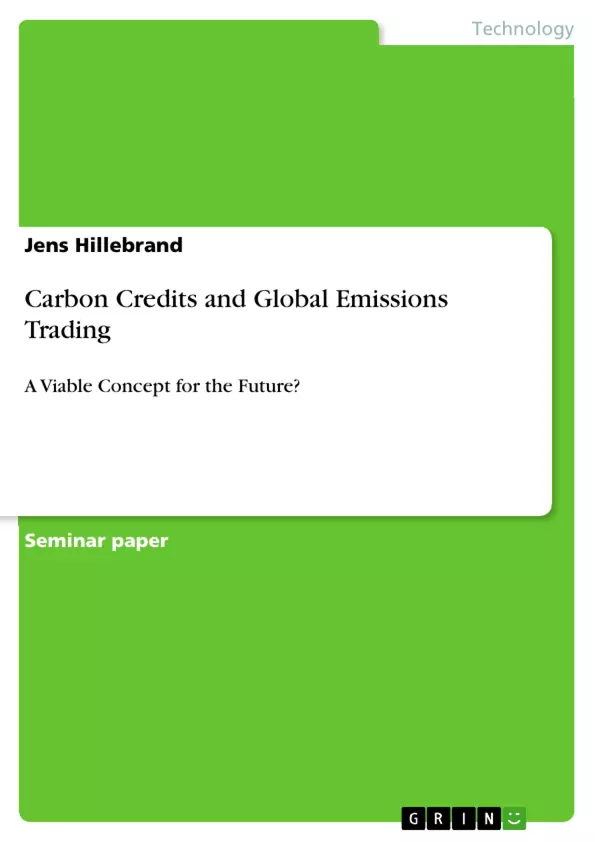The ongoing process of changes in the global climate system is rather undisputed these days, as it is evident from observations of increases in global average air and ocean temperatures, widespread melting of snow and ice as well as rising global sea levels. Moreover, while the exact causes for the currently observed increases in global temperatures are yet to be established, a growing consensus is emerging that at least part of it is human-caused. As a result, various panels and organisations have emerged throughout the world, which are working on strategies how to reverse or at least halt this process. As Kolk & Pinske point out the resulting climate policies across different sectors and locations are diverse. Various companies are trying to restructure their operations in order to reduce waste and to make their processes more energy efficient. A number of governments are enacting policies to replace CO2-intensive energy, released through the burning of coal, oil and gas by more environmentally friendly, so-called ‘clean’ energy, such as wind, solar, or hydroelectric power. Others are resorting back to nuclear power asserting that the actual risks of this technology are by far not as high as they are perceived to be or as they were some years ago. A further alternative that has recently been implemented by the EU is a ‘cap-and-trade system’ for energy-intensive industries, which defines strict limits for the absolute amount of emissions. While the responsibility for complying with this regulation rests with the companies in the respective industries, they are free to find ways how to stay within the limits. Compensating for emissions by purchasing carbon credits is one prominent option available to companies in this respect.
Purpose of this paper will hence be to analyse the current state of emissions trading development and assess the prospects of a universal worldwide emissions trading scheme.
Inhaltsverzeichnis (Table of Contents)
- Introduction
- Global Climate Change
- Intergovernmental Panel on Climate Change (IPCC)
- Emissions Trading
- The Concept
- Emissions Trading under the Kyoto Protocol
- The European Union Greenhouse Gas Emissions Trading Scheme
- International Carbon Action Partnership
- SWOT Analysis
- Conclusion
Zielsetzung und Themenschwerpunkte (Objectives and Key Themes)
This paper analyzes the current state of emissions trading development and assesses the prospects of a universal worldwide emissions trading scheme. It focuses on understanding global climate change, the role of the Intergovernmental Panel on Climate Change (IPCC), and the implementation of emissions trading systems, particularly the European Union Greenhouse Gas Emissions Trading Scheme.
- Global Climate Change and its Causes
- The Role of the IPCC in Climate Change Research
- Emissions Trading as a Climate Change Mitigation Strategy
- The European Union Greenhouse Gas Emissions Trading Scheme
- The Prospects for a Universal Worldwide Emissions Trading Scheme
Zusammenfassung der Kapitel (Chapter Summaries)
Introduction: This chapter provides an overview of global climate change and its potential causes, highlighting the growing consensus that human activity plays a significant role. It introduces the concept of emissions trading as a potential solution and outlines the paper's objective of analyzing its development and prospects.
Global Climate Change: This chapter defines global climate change and its relationship to the term 'global warming.' It introduces the Intergovernmental Panel on Climate Change (IPCC) and its role in assessing the impacts of climate change and exploring potential solutions.
Emissions Trading: This chapter delves into the concept of emissions trading, explaining its mechanics and exploring its implementation under the Kyoto Protocol. It further examines the European Union Greenhouse Gas Emissions Trading Scheme as a practical example and discusses the International Carbon Action Partnership.
Schlüsselwörter (Keywords)
Global climate change, Intergovernmental Panel on Climate Change (IPCC), emissions trading, Kyoto Protocol, European Union Greenhouse Gas Emissions Trading Scheme, carbon credits, environmental policy, sustainability, climate change mitigation.
Frequently Asked Questions
What is the main objective of emissions trading?
The goal is to reduce greenhouse gas emissions by setting strict limits (caps) and allowing companies to trade emission allowances to meet these targets efficiently.
How does the EU Greenhouse Gas Emissions Trading Scheme work?
It is a 'cap-and-trade' system where energy-intensive industries must hold permits for their CO2 emissions. If they exceed their limit, they must buy carbon credits.
What is the role of the IPCC in climate change policy?
The Intergovernmental Panel on Climate Change (IPCC) assesses scientific information on climate change and explores strategies for mitigation and adaptation.
What are carbon credits?
Carbon credits are tradable certificates representing the right to emit one tonne of carbon dioxide or an equivalent amount of different greenhouse gases.
Is a universal worldwide emissions trading scheme feasible?
The paper assesses the prospects of such a system, noting that while the EU scheme serves as a model, global implementation faces diverse political and economic challenges.
- Quote paper
- Jens Hillebrand (Author), 2008, Carbon Credits and Global Emissions Trading, Munich, GRIN Verlag, https://www.grin.com/document/115372



